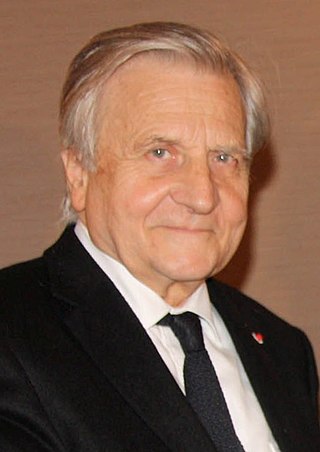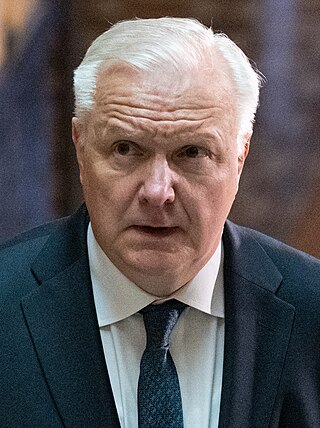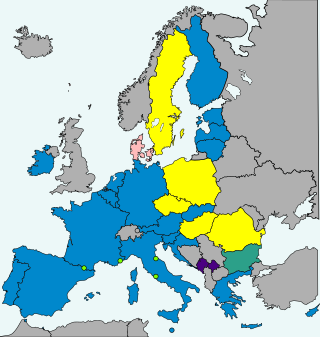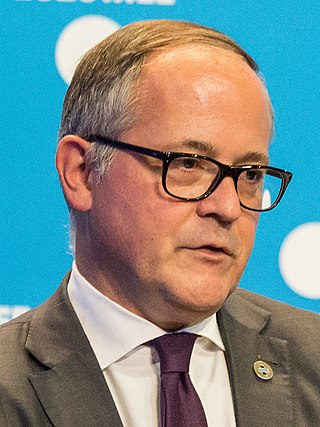
A central bank, reserve bank, national bank, or monetary authority is an institution that manages the currency and monetary policy of a country or monetary union. In contrast to a commercial bank, a central bank possesses a monopoly on increasing the monetary base. Many central banks also have supervisory or regulatory powers to ensure the stability of commercial banks in their jurisdiction, to prevent bank runs, and in some cases also to enforce policies on financial consumer protection and against bank fraud, money laundering, or terrorism financing.

The European Central Bank (ECB) is the prime component of the Eurosystem and the European System of Central Banks (ESCB) as well as one of seven institutions of the European Union. It is one of the world's most important central banks.

Captain William Hobson was an Irish officer in the British Royal Navy, who served as the first Governor of New Zealand. He was a co-author of the Treaty of Waitangi.

The European Exchange Rate Mechanism (ERM II) is a system introduced by the European Economic Community on 1 January 1999 alongside the introduction of a single currency, the euro as part of the European Monetary System (EMS), to reduce exchange rate variability and achieve monetary stability in Europe.

Jean-Claude Trichet is a French economist who was President of the European Central Bank from 2004 to 2011. Previous to his assumption of the presidency he was Governor of the Bank of France from 1993 to 2004.

The Central Bank of Ireland is the Irish member of the Eurosystem and had been the monetary authority for Ireland from 1943 to 1998, issuing the Irish pound. It is also the country's main financial regulatory authority, and since 2014 has been Ireland's national competent authority within European Banking Supervision.

Ralph Francis Alnwick Grey, Baron Grey of Naunton, was a New Zealand peer who served as the last Governor of Northern Ireland. He was created a Life Peer as Baron Grey of Naunton on 17 September 1968.

Olli Ilmari Rehn is a Finnish economist and public official who has been serving as governor of the Bank of Finland since 2018. A member of the Centre Party, he previously served as the European Commissioner for Enlargement from 2004 to 2010, European Commissioner for Economic and Monetary Affairs and the Euro from 2010 to 2014, and Minister of Economic Affairs in Juha Sipilä's cabinet from 2015 until 2016. Rehn ran for President of Finland as an independent candidate in 2024, but was not elected.

Bulgaria plans to adopt the euro and become the 21st member state of the eurozone. The Bulgarian lev has been on the currency board since 1997 through a fixed exchange rate of the lev against the Deutsche Mark and the euro. Bulgaria's target date for introduction of the euro is 1 January 2025, which would make the euro only the second national currency of the country since the lev was introduced over 140 years ago. The official exchange rate is 1.95583 lev for 1 euro.

Quantitative easing (QE) is a monetary policy action where a central bank purchases predetermined amounts of government bonds or other financial assets in order to stimulate economic activity. Quantitative easing is a novel form of monetary policy that came into wide application after the financial crisis of 2007–2008. It is used to mitigate an economic recession when inflation is very low or negative, making standard monetary policy ineffective. Quantitative tightening (QT) does the opposite, where for monetary policy reasons, a central bank sells off some portion of its holdings of government bonds or other financial assets.

Christine Madeleine Odette Lagarde is a French politician and lawyer who has served as President of the European Central Bank since 2019. She previously served as the 11th Managing Director of the International Monetary Fund (IMF) from 2011 to 2019. Lagarde had also served in the Government of France, most prominently as Minister of the Economy, Finance and Industry from 2007 until 2011. She is the first woman to hold each of those posts.

Yves Mersch is a Luxembourgish jurist and lawyer who served as a member of the Executive Board of the European Central Bank from 2012 to 2020. He previously served as first Governor of the Central Bank of Luxembourg from 1998 to 2012.
Philip Richard Lane is an Irish economist who has been serving as a member of the Executive Board of the European Central Bank since 2019 and concurrently as ECB chief economist. He previously served as Governor of the Central Bank of Ireland from 2015 to 2019. As ECB Chief Economist, Lane is seen by many as providing an academic counterweight to the traditional political abilities of ECB President, Christine Lagarde.

Banknotes of the euro, the common currency of the eurozone, have been in circulation since the first series was issued in 2002. They are issued by the national central banks of the Eurosystem or the European Central Bank. The euro was established in 1999, but "for the first three years it was an invisible currency, used for accounting purposes only, e.g. in electronic payments". In 2002, notes and coins began to circulate. The euro rapidly took over from the former national currencies and slowly expanded around the European Union.

Benoît Georges Cœuré is a French economist who has been serving as President of the Autorité de la concurence since 2022. He previously served as a member of the Executive Board of the European Central Bank from 2012 to 2019.

Luis de Guindos Jurado is a Spanish politician serving as Vice-President of the European Central Bank since 2018. He previously served as Spain's Minister of Economy, Industry and Competitiveness from 2011 to 2018.

Shaktikanta Das is serving as the current & 25th governor of the Reserve Bank of India (RBI). He was earlier a member of the Fifteenth Finance Commission and India's Sherpa to the G20. Das is a retired 1980 batch Indian Administrative Service (IAS) officer of Tamil Nadu cadre.
Sharon Donnery is an Irish economist and financial regulator who has served as a Deputy Governor of the Central Bank of Ireland since March 2016. She served as the Governor of the Central Bank of Ireland on an acting basis from June 2019 to August 2019, having occupied increasingly senior positions in economics, consumer protection and regulatory roles since joining the body in 1996. As of 1 July 2022 she is responsible for financial regulation in Ireland. The legislation underpinning the role of the Central Bank of Ireland sets out four statutory positions: Governor, Head of Central Banking, Head of Financial Regulation and Registrar of Credit Unions. As of July 2022, Donnery has the distinction of being the only person to have held all four positions, albeit that she occupied the Governor role on an acting basis.

Fabio Panetta is an Italian economist who has been serving as Governor of the Bank of Italy since 2023. He previously served as a member of the Executive Board of the European Central Bank from 2020 until 2023. Prior to his ECB appointment, Panetta served as Senior Deputy Governor of the Bank of Italy and concurrently as President of the Institute for the Supervision of Insurance from May to December 2019.

Frank Elderson is a Dutch lawyer who has been serving as a member of the Executive Board of the European Central Bank since 2020.

















